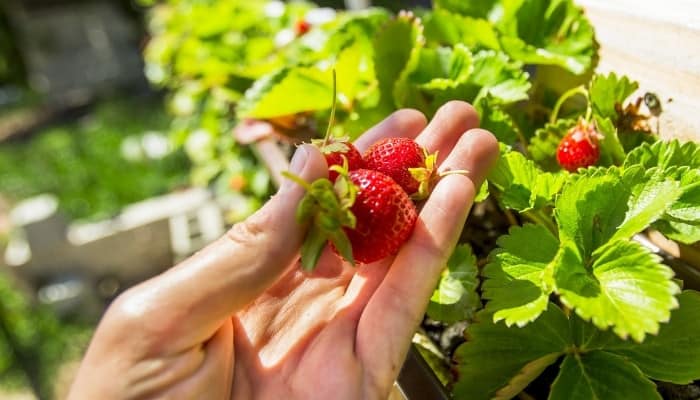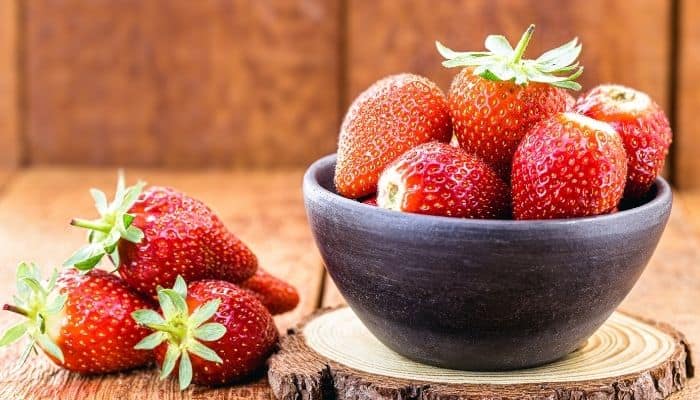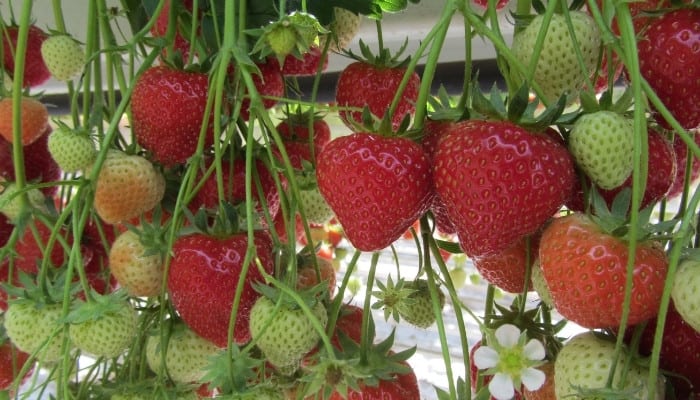Are you curious about whether or not hydroponic strawberries are considered organic?
Whether you’re thinking about growing them or are simply curious about the produce at the local grocery store, it is a legitimate question.
Are hydroponic strawberries organic? Hydroponic strawberries may indeed be organic. However, they may also be grown in a hydroponic system that uses artificial nutrients. Ultimately, whether or not hydroponic strawberries are organic or not depends on how the plants are fed and cared for.
Read on below and learn exactly how (and why) hydroponic strawberries are (or aren’t) organic!
What Does Organic Mean?
The term “organic” generally indicates that the items were produced following the principles of organic agriculture.
Organic foods are typically grown without the use of synthetic chemicals and GMOs and are often perceived as more environmentally friendly and potentially healthier options.
How Hydroponic Strawberries Are Grown
Hydroponic strawberries are grown just like any other plant grown with hydroponics; they are plugged directly into grow sites where they obtain nutrients from the water rather than being transplanted into containers with soil or the ground in the garden.
You may start the strawberry plants from seeds and wait a few weeks for seedlings to start growing, or you can purchase starter plants.
At any rate, plant your new strawberry plants directly into net pots within your hydroponic system immediately.
Do so by filling the bottom of the netted pot with growing medium, and gently place the plant in with roots spread as wide open in all directions as possible.
Complete the planting process by filling the rest of the container up with growing medium and placing it in the proper grow site within your hydroponic growing system, being sure the roots are submerged sufficiently.
Once your strawberries are growing, the hydroponic system does all of the work. All you need to do is monitor the progress and make tweaks to the system as needed.
Depending on the species, you may expect your first berries to appear within 3 to 4 weeks or it may take as long as 3 to 12 months.
Hydroponic Systems
When it comes to selecting a hydroponic system for your strawberries, the option that makes the most sense is the ebb-and-flow system.
Ebb-and-flow hydroponic systems are perfect for strawberries because they allow for a large number of plants and they take up little space because they can be stacked.
Furthermore, the ebb-and-flow systems used for growing strawberries preserve water as they simply flood the channels, moistening and submerging roots temporarily, and then quickly drain back into the main reservoir.
Nutrients
Strawberries are truthfully one of the easiest crops to grow in a hydroponic system. Part of the reason behind this is due to the basic nature of the nutrients they require.
Strawberries in hydroponic growing systems should be fed with liquid solutions (or water-soluble powders) that include nitrogen, potassium, and phosphorus, but they also require micronutrients, sulfur, magnesium, and calcium.
More or less, practically any basic general-purpose hydroponic liquid nutrient solution, like this one featuring guano and worm castings, will do the trick for feeding hydroponic strawberries everything they need to grow and thrive.
Hydroponic vs. Organic
“Hydroponic” and “organic” are two distinct terms related to farming and agriculture, each with its own meaning and practices. Here’s a comparison of the two:
Hydroponic: Hydroponics is a method of growing plants without using soil. Instead, plants are grown in a nutrient-rich water solution, often with added minerals and nutrients to support their growth.
The roots of the plants are submerged in the nutrient solution, and the plants receive support through various growing mediums, such as perlite, coconut coir, or rockwool.
Hydroponic systems can range from simple setups to more complex systems with automated nutrient delivery.
Organic: Organic farming is an agricultural approach that focuses on sustainability, soil health, and minimizing the use of synthetic chemicals.
Organic farming aims to work with natural processes to maintain and enhance soil fertility, while also promoting biodiversity and animal welfare.
Organic practices generally exclude the use of synthetic pesticides, weed killers, and synthetic fertilizers. Instead, organic farmers rely on techniques such as crop rotation, composting, cover cropping, and natural predators to manage pests and maintain soil health.
Differences:
- Growing Medium: In hydroponics, plants are grown without soil, using a nutrient-rich water solution and various growing mediums. In organic farming, soil is a fundamental component, and practices are centered around maintaining and improving soil health.
- Nutrient Source: Hydroponic systems provide nutrients directly to plants through the water solution. Organic farming relies on the natural fertility of the soil, supplemented with compost, cover crops, and natural amendments.
- Chemical Use: Hydroponic systems can use synthetic nutrients and chemicals, although some hydroponic practitioners also explore organic nutrient solutions. Organic farming strictly limits the use of synthetic chemicals and encourages natural methods of pest control and soil improvement.
- Certification: Organic farming can be certified through regulatory bodies that establish standards for organic practices. Hydroponic systems can also achieve organic certification if they adhere to these standards, although there has been debate within the organic community about whether hydroponics truly align with the principles of organic agriculture.
- Environmental Impact: Organic farming emphasizes sustainable practices, soil conservation, and biodiversity. Hydroponics can be more resource-efficient in terms of water usage and space, but the environmental impact can vary depending on factors such as energy use for indoor hydroponic systems.
Advantages of Growing Strawberries Hydroponically
The advantages of growing hydroponic strawberries are many:
- Cleaner and easier to maintain than soil-based growing
- Fewer pests and diseases to combat
- Less water usage than soil-based gardening (because it recycles itself and there is little evaporation)
- Larger, juicier, tasty, better-looking fruits
- A healthier and fruitier strawberry aroma
- One of the easiest hydroponic plants to master
- Hydroponically grown strawberries have a high retail value
Disadvantages To Growing Strawberries Hydroponically
The disadvantages to growing strawberries in a hydroponic system include:
- Initial setup costs can be high
- Requires technical knowledge and monitoring
- Susceptible to equipment failures
- May require energy for lighting and water circulation
- Precise nutrient management is essential
- Limited organic certification acceptance
- Can be more vulnerable to disease outbreaks
- Potential for waterborne pathogen contamination
- Lack of soil may affect flavor and texture
- Dependence on purchased nutrient solutions
What Qualifies Strawberries as Organic?

In order for strawberries to be qualified as, or certified as, organic, they must be grown without even a drop of synthetic fertilizer, pesticide, or nutrients.
The strawberries must also not be a GMO (Genetically Modified Organism) variety. In other words, they must be a natural strawberry variety and be grown with natural ingredients only.
How Hydroponic Strawberries Can Be Grown Organically
It may seem confusing at first that a hydroponic strawberry grown without even a spec of soil may be considered organic.
But, the truth is, hydroponic strawberries can indeed be grown just as organically as a head of lettuce growing in the garden in a compost and soil mix.
How is that so? Simple: provide them light, water, and 100% natural nutrients (like sheep manure or whatever you prefer).
Also, avoid using any sort of man-made ingredients (like fungicide, pesticide, or bloom boosters).
If you really want to go the whole nine yards, you could also use distilled rainwater and situate your hydroponic system outside where it receives natural sunlight.
But, that isn’t actually necessary for organic certification of your strawberries.
Nutrient Content of Organic Hydroponic Strawberries
Organic hydroponic strawberries are grown without the use of synthetic pesticides, herbicides, and fertilizers, adhering to the core values of organic agriculture.
In this controlled hydroponic environment, strawberries that are grown receive their nutrients from an organic nutrient solution, providing a balanced blend of essential minerals.
The controlled nature and growing technique of hydroponic systems allow for precise management of nutrient levels, optimizing the growth conditions for nutritious strawberries.
While traditional organic farming relies on soil health for nutrient uptake, organic hydroponics focuses on delivering nutrients directly to the plants through the water solution and growing medium.
This approach can lead to efficient nutrient absorption and potentially influence the nutrient profile of the strawberries.
However, the nutrient content of organic hydroponic strawberries can be influenced by factors such as the specific nutrient solution composition, the variety of strawberry, and the duration of growth.
Hydroponic strawberries grown using organic methods may exhibit differences in flavor and nutrient levels compared to conventionally grown strawberries or those grown through other organic methods.

How To Know if Hydroponic Strawberries You Buy Are Organic
To determine if store-bought hydroponic strawberries are organic, you can follow these steps:
- Check for Organic Certification Label: Look for a label that indicates the strawberries are certified organic. This label is usually provided by a recognized organic certification body and assures consumers that the product has been grown and produced according to organic standards.
- Read the Packaging: Examine the packaging for any claims related to organic farming practices. Phrases like “organically grown,” “certified organic,” or “grown without synthetic pesticides” are indications that the strawberries might be organic.
- Look for the USDA Organic Seal: In the United States, the USDA Organic Seal is a reliable indicator of organic certification. If you see this seal on the packaging, you’re looking at a product that meets the USDA’s organic standards.
- Read the Product Description: If you’re buying online, it’s important to read the product description or details provided by the retailer. They often mention whether the strawberries are organic and may provide additional information about their growing methods.
- Check the Price: Organic products, including strawberries, can sometimes be priced higher than conventionally grown ones. If the price is significantly higher, it might be an indicator that the strawberries are organic.
- Research the Brand or Farm: If you’re familiar with the brand or farm that produces the strawberries, research their practices. Many organic hydroponic farms proudly display their organic certifications on their websites or product information.
- Ask Store Staff: If you’re uncertain about the organic status of the hydroponic strawberries, don’t hesitate to ask store staff for assistance. They can often provide information about the products they carry.
Frequently Asked Questions:
Are Hydroponics Considered Organic?
Whether or not hydroponics are considered organic depends on how the system is run and maintained.
The main factors that go into determining whether or not a hydroponic system is organic or not are the types of water, nutrients, and light to which the plants in the system are exposed.
Legally, hydroponic operations may attain organic certification just like any other organic produce operation (like farms and markets).
Are Hydroponic Strawberries Safe?
Hydroponic strawberries are just as safe to eat as any other type of strawberry out there.
In fact, in many cases, organic hydroponic strawberries are safer and sweeter than soil-grown berries that have been exposed to harmful pesticides and fertilizers and contain residue.
A common misconception about hydroponics is that they rely on some sort of chemicals to do their “magic,” but they don’t.
Why Are Hydroponic Strawberries Not Organic?
Hydroponic strawberries often face challenges in obtaining organic certification due to the nature of their cultivation methods.
The nutrient solutions and potential use of nonorganic additives like synthetic pesticides typically do not align with strict organic standards.
Organic certification places a strong emphasis on natural nutrient sources, soil health, and avoidance of synthetic chemicals.
As a result, the use of controlled nutrient solutions and the absence of traditional soil in hydroponic systems can create a disconnect from the core principles of organic farming, making it difficult for hydroponic strawberries to meet the criteria for organic certification in many cases.
Are There Organic Nutrients for Hydroponics?
Yes, there are organic nutrient solutions specifically designed for hydroponic systems. These solutions aim to provide the necessary nutrients for plant growth in a way that aligns with organic principles.
While traditional hydroponic nutrient solutions might include synthetic chemicals, organic hydroponic nutrient solutions are formulated with natural and organic sources of nutrients.
These solutions can contain various organic ingredients such as compost extracts, seaweed extracts, fish emulsions, and other plant-based materials.
Are Pesticides Used in Hydroponics?
Yes, pesticides can be used in hydroponics, but the type and frequency of pesticide use can vary depending on the specific hydroponic system and the preferences of the grower.
Hydroponic systems provide controlled environments for plant growth, which can help minimize the need for pesticides, but they are not completely immune to pest and disease challenges, and products to combat issues are often used.
Do Hydroponic Strawberries Taste Better?
The taste of hydroponic strawberries compared to traditionally grown ones can vary based on factors such as the hydroponic system, growing conditions, and individual preferences.
Hydroponic systems offer precise nutrient control, potentially influencing flavor positively if managed well. However, variety, ripeness at harvest, and personal taste preferences play significant roles.
Strawberries grown in hydroponic systems might offer a slightly firmer texture due to controlled environments, but both hydroponic and soil-grown strawberries can come in a range of flavors.
So, Are Hydroponic Strawberries Organic?
The bottom line about hydroponic strawberries is that they can be organic, but it isn’t always the case.
Whether or not the fruit is organic depends on the environment in which they’re grown and the food they’re provided.
Real organic nutrients produce real high-grade organic strawberries. Synthetic nutrients, on the other hand, infuse hydroponic strawberries with man-made nutrients.
If you’re buying them, not growing them, remember to check out the label before putting them in your basket. Whether or not they’re organic should be clearly stated on the packaging.

